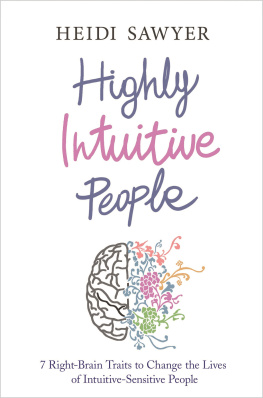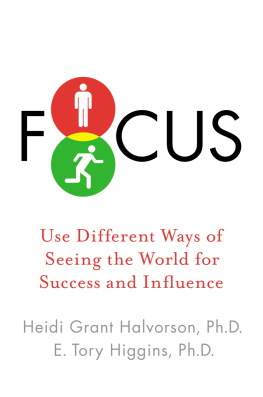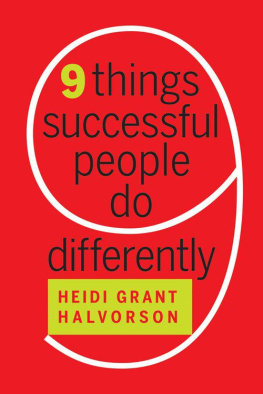HEIDI GRANT Author of 9 Things Successful People Do Differently Re in How to Get People to Help You force m H A R V A R D B U S I N E S S R E V I E W e P R E S S nts Re in force ments FM Page i 26/02/18 3:25 PM FM Page ii 26/02/18 3:25 PM HEIDI GRANT Re in How to Get People to Help You force ments H A R V A R D B U S I N E S S R E V I E W P R E S S B O S T O N , M A S S A C H U S E T T S FM Page i 17/03/18 12:59 PM HBR Press Quantity Sales Discounts Harvard Business Review Press titles are available at significant quantity discounts when purchased in bulk for client gifts, sales promotions, and pre-miums. Special editions, including books with corporate logos, customized covers, and letters from the company or CEO printed in the front matter, as well as excerpts of existing books, can also be created in large quantities for special needs. For details and discount information for both print and ebook formats, contact booksales@harvardbusiness.org, tel. 800-988-0886, or www.hbr.org/bulksales. Copyright 2018 Heidi Grant All rights reserved No part of this publication may be reproduced, stored in or introduced into a retrieval system, or transmitted, in any form, or by any means (electronic, mechanical, photocopying, recording, or otherwise), without the prior permission of the publisher. Requests for permission should be directed to permissions@hbsp.harvard.edu, or mailed to Permissions, Harvard Business School Publishing, 60 Harvard Way, Boston, Massachusetts 02163.
The web addresses referenced in this book were live and correct at the time of the books publication but may be subject to change. Library of Congress Cataloging-in-Publication data Names: Halvorson, Heidi Grant-, 1973- author. Title: Reinforcements : how to get people to help you / by Heidi Grant Halvorson. Description: Boston, Massachusetts : Harvard Business Review Press, [2018] Identifiers: LCCN 2017054355 | ISBN 9781633692350 (hardcover : alk. paper) Subjects: LCSH: Help-seeking behavior. | ManagementPsychological aspects. | ManagementPsychological aspects.
Classification: LCC HM1141 .H35 2018 | DDC 153.8/52dc23 LC record available at https://lccn.loc.gov/2017054355 eISBN: 9781633692367 FM Page ii 17/03/18 12:59 PM Contents Part One: Asking for Help Is the Worst 1. It Makes Us Feel Bad 2. We Assume Others Will Say No 3. We Assume Asking for Help Makes Us Less Likable Part Two: How to Ask Anyway 4. The Inherent Paradox in Asking for Help 5. The Four Steps to Getting the Help You Need 6.
Dont Make It Weird Part Three: Creating a Culture of Helpfulness 7. The In-Group Reinforcement 8. The Positive Identity Reinforcement 9. The Effectiveness Reinforcement Notes179Index189Acknowledgments199About the Author201 FM Page iii 17/03/18 12:59 PM Part One Asking for Help Is the Worst Part 1 Opener Page 1 17/03/18 12:48 PM Part 1 Opener Page 2 17/03/18 12:48 PM Chapter 1 It Makes Us Feel Bad Raise your hand if you have ever asked for help atwork or at home.Raise your hand if you have ever felt shy or stupid indoing so.I think I can safely assume that most of us arewaving our arms wildly. Alina Tugend, Why Is Asking for Help So Difficult?, New York Times, July 7, 2007 I actually felt as if I were going to perish. Psychologist Stanley Milgram, on asking a subway rider for their seat Vanessa Bohns is a professor of organizational behavior at Cornell University who, along with her frequent collaborator Frank Flynn at Stanford, has spent years studying how people ask for helpor more specifically, why they are so reluctant to do so. Chapter_01 Page 3 17/03/18 11:32 AM 4 AskingforHelpIstheWorst Her studies often involve telling participants that they will have to approach a series of strangers and ask for a favor. These favors are generally innocuous: fill out a short survey, guide me to a particular building on campus, let me borrow your cellphone for a moment.
No one is asking for large sums of money, a pint of blood, or a firstborn child. Yet, as Bohns describes it, As soon as we tell all of our participants in these studies [what they have to do], its palpable the sense of fear and anxiety and dread. The whole room changes. Its just like the worst thing we could ask these people to do.1 However bad you might think being in one of Bohnss experiments would be, theyve got nothing on the 1970s subway studies of Stanley Milgram. (You may remem ber him as the controversial psychologist whose most famous studiesrequiring participants to give what they believed to be life-threatening shocks to another personforever altered our understanding of obedience to authority. Clearly, it was not pleasant to be in any of Milgrams experiments.) One day, after listening to his elderly mother com plain that no one on the subway had offered to give her their seat, Milgram wondered what would happen if one were to just ask a subway rider for their seat? So he recruited his graduate students to go find out.
He told them to board crowded trains in New York City and ask individuals at random for their seat. The good Chapter_01 Page 4 17/03/18 11:32 AM It Makes Us Feel Bad 5 news: 68 percent of people willingly gave up their seats upon request. The bad news: conducting the study wasto this dayamong the worst, most traumatic experiences his students had had in their lifetimes. One student, Kathryn Krogh, a clinical psychologist, recalled feeling sick to her stomach the first time she approached a passenger. Another student (and former professor of mine), Maury Silver, managed to make the request only once: I start to ask for the mans seat. Unfortunately, I turned so white and so faint, he jumps up and puts me in the seat.2 Milgram, a bit skeptical as to what all the fuss was about, decided to try asking for a seat on the subway himself.
He was shocked at the extent of his own dis comfort; it took him several attempts just to get the words out, so paralyzed was he with fear. Taking the mans seat, I was overwhelmed by the need to behave in a way that would justify my request, he said. My head sank between my knees, and I could feel my face blanching. I was not role-playing. I actually felt as if I were going to perish.3 Although the idea of asking for even a small amount of help makes most of us horribly uncomfortable, the truth about modern work is that we rely, more than ever, on the cooperation and support of others. No one succeeds in a vacuum, whether you are in an entry-level position or have a view from the C-suite.
Cross-functional teams, Chapter_01 Page 5 17/03/18 11:32 AM 6 AskingforHelpIstheWorst agile project management techniques, and matrixed or hierarchy-minimizing organizational structures mean were all collaborating more and having to suffer the small agony of asking people to help us on a regular basis. And Im not just talking about getting help from your colleagues and peers; if you are a leader, you need to figure out how to elicit and coordinate helpful, sup portive behavior from the people you are leading, too. Arguably, that is what management is. Yet our reluctance to ask for help means we often dont get the support or the resources we need. Making matters worse, our intuitions about what should make others more likely to help are often dead wrong; our fumbling, apologetic ways of asking for assistance gen erally make people far less likely to want to help. We hate imposing on people and then inadvertently make them feel imposed upon.
Theres an inherent paradox in asking someone for their help: while help freely and enthusiastically given makes the helper feel good, researchers have found that the emotional benefits of providing help to others dis appear when people feel controlledwhen they are instructed to help, when they believe that they should help, or when they feel they simply have
Next page










